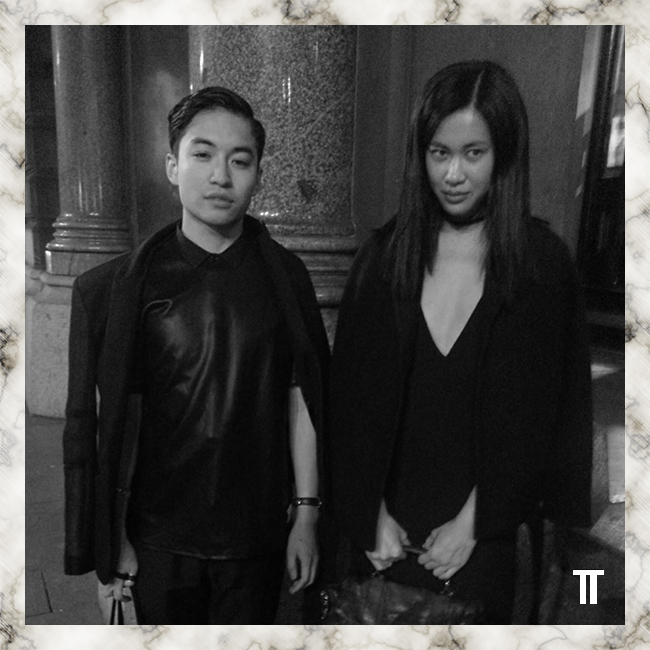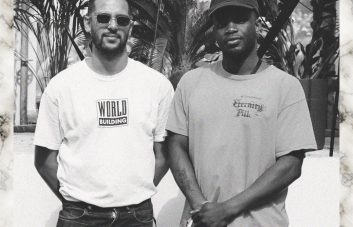Sydney via Seoul’s Victoria Kim deliver our 103rd Truancy Volume, a whirlwind exploration of the hybridization of K-Pop and the UK’s pummelling drum trax. Initially producing a host of housey RnB edits, the duo have recently turned to Korean vocal work for inspiration, setting in motion a host of bootlegs that will be compiled on the forthcoming Karaoke Pt. 1 mixtape. Quietly working away in and behind the scenes of Sydney’s small but dedicated dance music community, Victoria Kim have expanded their horizons and began to garner some international interest – not always an easy step for artists from this part of the world.
Picking up the philosophy of hybridity in Fade to Mind’s edit culture, Victoria Kim’s bootlegs add something new to the conversation. This glocalisation, casually referred to as ’K-grime’, reflects the duo’s geographical and cultural duality but also breaks down the constructed barriers between the cultures it investigates. TV103 demonstrates that there is an incredibly large amount of amazing music made in Asia that is overlooked by the Orientalist gaze and the industry’s media that sits together beautifully with Europe’s equally forward-thinking club trax. There’s more in common with contemporary pop’s Other than we may initially think and, perhaps more importantly, the combination destabilises the binaries of East and West, underground and mainstream, promoting instead an idiosyncratic chimera in which the lines are blurred. While there is a long discussion to be had about the cultural sensitivity of this stance (some of which was covered in our interview, in which our differing approaches came to the fore), the mix is nonetheless symptomatic of our obsession with speed and newness: “there’s this obsession with impatience, people want to hook onto as many trends as possible in as short a time as possible.” While some, this writer included, approach this fact with some apprehension, Victoria Kim seem to revel in it, feeding off its multiplying ability to distort and abstract.
Stitched together while in Seoul, the mix tracks a journey from the city’s mega-cafés into its clubs, where different spaces induce odd juxtapositions – the café’s RnB vocals linger and mix with the club’s clanging drums. The result is unlike anything we’ve hosted and lays out a heap of new ground to be explored. We met up with half of the duo in Sydney’s most marble and glass-laden shopping center to discuss hating Australia’s house fetishism, appropriation and doing things wrongly.
The first thing I wanted to ask was just about the Australian dance scene – there’s a big predisposition for house and techno but recently there are people like yourself, Air Max ‘97, Strict Face and Dexter Duckett who are doing things differently. “The thing I love about Australia is everyone is just imitating someone else’s music. I guess that’s how I understand Asian music as well – K-pop is just a copy of American pop music and American RnB, so the same applies to Australian club music except we do it so wrong that it becomes something new and becomes something fresh.” I think that’s a really interesting aspect of Australian culture in that we are, in a sense, culturally nomadic, with very little homegrown culture to rely on. That’s why I’ve been really excited about how a different sound might develop here, particularly with someone like Air Max 97. “That’s true, you can see where he draws stuff from as well though. I think we all are trying to imitate something, like I’m just taking ballroom rhythms and stealing K-Pop vocals and using that instead of queer or American stuff, because that sounds more exciting to me. I think Strict Face has got this perfect thing where he’s doing grime but he isn’t doing it as a British person and I know a lot of people who find that kind of unsettling…. It’s cool and funny. I love appropriation, I don’t really know why people get so worked up about it. I mean, I’m not queer and I’m not black but I did a track with Divoli (S’vere), and he just doesn’t care. If you look at someone like Koppi Mizrahi from Tokyo – she’s a woman and she doesn’t do drag or anything but she’s part of Qween Beat and they love her. Appropriation is a funny thing, it’s something that people get pissed off about but the actual people who make the music often don’t care, or they love it, in fact.” Right, well especially with ballroom you have these really pertinent and meaningful cultural symbols, like the Ha! crash, and I guess the worry is that it will just turn into some empty trend that forgets a really important social and political element to that music, in turn effacing and silencing the original voices. “Yeah, there is the worry that it just slips into something like the trap hi-hat trills. But I remember talking to someone from Fade to Mind and they were saying just make your own Ha, so I did. It’s a high pitched Chinese gong, and then a Korean person going “ha!” Appropriating something and making it your own is a different thing.”
How do you feel about the health of the club scene in Sydney? “I think it’s cool but I don’t get why everyone is so into analogue technology and ‘hardware’. Too much white boy music. Maybe it all started in Melbourne, probably did. And that whole Australiana thing of wearing weird jackets and making music in the desert… whatever. (laughs)”
So what are some of the processes and thoughts behind the hybridization of K-pop and grime / club music you’ve been working on? “Well, firstly, bootleg culture is very common in Asia. With every major album that comes out they always release acapellas and instrumentals alongside. The point of this is to encourage bootlegging, but it’s also so that the tracks can be used for Karaoke. So if you have the instrumentals, people cover it on Youtube – so many artists get picked up from Youtube by the major record labels. I also see Asian pop music as a clone of American pop music, but it’s a clone that tries to be ten steps ahead always. So the example people often talk about is Hyuna’s “Bubble Pop“, where you have these EDM or dubstep drops 30 seconds in. So there’s this obsession with impatience, people want to hook onto as many trends as possible in as short a time as possible, and consequently people don’t really last so long over there. So with guys like Her Records, who are pushing stuff out as quickly as possible, digital only, I’m watching this strand of dance music moving so fast but trying to parallel it with this strand of pop music that’s moving so fast. Because there’s nothing interesting about putting a Destiny’s Child acapella over a new track. It’s like, why not use new vocals?” I suppose there’s also an interesting parallel there between how Asian pop music functions and how the Soundcloud trend cycle functions, where you have these genres – one month its moombahton, then it’s footwork, then it’s kuduro – that are ingested and spat out at a rate of knots. Everyone’s just ruthless. “I think that’s good, I think you need to be as ruthless as you can in music. I buy lots of vinyl but I also don’t care for it. It’s too slow. I might play around with it at home, but when it comes to playing out, USBs only… no questions. Sometimes I have these sound guys come up to me like, “are you playing a Youtube rip!?” and I’m like, “Yep…” (laughs) But that’s the thing, I’ve talked to sound guys everywhere in Sydney and they just don’t understand, they just like rock music. It’s not like we have Funktion One in every club here, or even that what we play is mastered properly. All we do is slap a limiter on to make it louder… it doesn’t matter.”
On a lot of your promo material you refer to your stuff as ‘Asian house’ or ‘sino house’, I was just wondering how being between Australia and Korea has influenced your stuff. “Honestly, when we try and make music we try and think of ourselves in that in-between space. That’s kind of the Victoria Kim idea – it’s a music between worlds that’s compromised between worlds. There’s a guy I know from Cakeshop in Seoul who often plays our tracks, the mashups in particular, and people love them there, because they’re hearing these raw UK drum tracks with K-pop vocals over the top and they don’t know how to react. It’s that same idea of not knowing how to react to dance music, but that’s the way you can introduce that kind of music to them, you know. You can do that the other way around as well, we’re also trying to introduce European people to K-Pop because they know their NS and FTM instrumentals but they don’t know the vocals.” So it’s a very cultural project. “It is, we’re really trying to make the two cultures meet. It’s a project of multiculturalism. It’s a project of assimilation maybe.” Oooh, I think we’re getting into probo (read: Australian for problematic) territory there with assimilation… I tend to think of it more as hybridization, that at least there is some form of exchange. “Yeah, it’s interesting though. I’m from Hong Kong, my entire country was assimilated by bloody British people… but we kinda liked it. (laughs) But a lot of Hong Kong people will tell you, “we love the British, we like the fact that they came here”. Which is obviously a very different approach from most colonized countries and that really feeds into what we do.”
When I first encountered your music it was more of a straighter house or garage variety, and I feel like at a certain stage a whole lot of things changed perhaps with the entrance of the Night Slugs/Fade To Mind diaspora. “It’s always been there, but I don’t think we’ve ever taken the risk to make that kind of music. I think the first thing that got any attention was “Talk Talk“, which is a Korean cover of Justin Bieber so the Korean influence has always been there. With Night Slugs, in terms of production, I don’t think there is a huge influence, but in terms of approach there is a huge influence. This idea of pinching from different areas and… making something wrongly? I remember reading an interview with Bok Bok where he talked about making “Silo Pass,” and he was saying that he was trying to imitate Wiley but did it all wrong and that’s how it came about.” This idea of making something wrongly is so prevalent in the narrative of dance music, since the very beginning with the development of Acid House through to UK Garage and footwork. “Yeah exactly right, and we just need to keep doing it with newer stuff. Do it wrong. Have your little Ableton stretch marks in there … whatever. There’s no need to argue about authenticity… be happy! Asian music is the fakest music in the world, it doesn’t matter, same with the PC Music stuff. I’m so happy it’s happening, if anything its actually finally driving people towards Asian music. People are only just realizing.”
Could you tell me about the karaoke mixtape that you’re working on? “Well, it’s supposed to be a series. Druture from Los Angeles will be on it, and maybe Strict Face. I have an EP that’s done and a single with Breach that was supposed to come out but I’m not sure about that. I don’t worry too much about releases. I’m hoping to start this thing called Pure Ginseng, which will kick off with the Karaoke mixtape and will hopefully release music as quickly as possible. I’m mainly looking towards Asian producers, producers who are imitating the Night Slugs thing but very late in the game, really. Guys like Moslem Priest, a couple of Korean vocalists like Kitty B and Hoody, Strict Face. A lot of the karaoke stuff is on the mix we did for you guys. Then hitmaking in Seoul with Druture, going on all the big labels… putting dance music in a different place.”
Tell us a bit about the mix you made for us. “Well, there’s this habit I got into when I was in Seoul, because coffee shops there close at like 2AM and, like, everyone is in coffee shops all the time, so I would just sit and smoke and make mixes and mashups all day. But there’s this idea of going from the café to the club. You’d go and get a coffee, the cafe would close and you’d catch a cab to the club, finish at seven in the morning and go back and get another coffee. So that was kind of the culture that I wanted to capture. This thing would always happen where I’d be at the club but still singing these acapellas in my head from the café – there was a club that I went to that was opposite a convenience store that was blaring the same 4 songs all day, so you’d come out of the club with melodies in your head and be affronted by a thrashing EDM beat… The mix came from this idea that you’re listening to Korean RnB and it kind of lingers, then all of a sudden these UK drum tracks come in, so that was my experience. Basically it’s Korean acapellas all the way through but the music and the rhythms change vastly. Just bridging that gap, that’s the idea. It’s not a club mix. People have this thing of like, “it’s just what I’m playing out at the moment.” No, this was made on Ableton, straight up. It was meant to portray that experience of going from the café to the club and having those ideas lingering in your head and crossing over when you don’t want them to. It’s not what I play out, that’s boring. (laughs)” There’s still a whole lot of untapped potential in Ableton mixing, in using that new technology wrongly. “Yeah, there is a different attitude to making a mix on Ableton, it feels very rehearsed, which is fine. People tell me that I lose the live element, but that’s just not interesting to me, we’ve moved on. I’m all for it being as produced as possible, where you can hear the stretch marks and it sounds all artificial, it doesn’t matter.”
Tracklist:
태민 (TAEMIN) – ACE
WINNER – 이 밤 (Tonight)
후디 (Hoody) – Baby Oh Baby
Victoria Kim – Skinship (VIP)
이효리 (Lee Hyori) – Want Me Back
Victoria Kim – Wolf Cell [EXO x Nguzunguzu]
KittiB – I’m a WOMAN
Victoria Kim – Bamboo Ceiling [VIP ft. Kemy]
Grovestreet – Something (Victoria Kim CL edit)
Coris – Pleasure Rose [이하이(Lee Hi) x Sudanim]
Victoria Kim – HIM (VIP)
Imaabs – Smoke Signal x Upper Echelon
Victoria Kim – 압구정 고속도로 (Apgu Freeway)
Air Max ’97 – ______ (Victoria Kim GD Air Max Mix)
Rico Love – Three
Koppi Mizrahi (コッピ・ミズラヒ) – Koppi’s Elevator (Bitch you twerk, I vogue)
Victoria Kim – RIB FLICKER (리브 플리커)
Miss Modular – Earplug
Kimbra – Settle Down (B. Ames Remix)
Victoria Kim – Talk Talk (VIP)
Neana – Slow
Victoria Kim – IT MY WOMAN [KOREAN VER.] (그것은 내 여자)
Victoria Kim – RED LIGHT
Strict Face – Creep Zones II (Miss Modular Club Mix)
Coris – BigBangFatale [BIGBANG x Neana x Ra’s Al]
BIGBANG – 하루하루 Haru Haru (Live)





oath!!!!